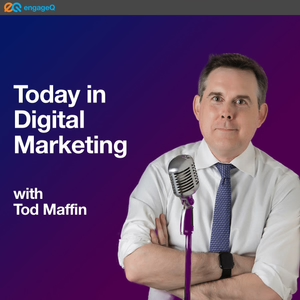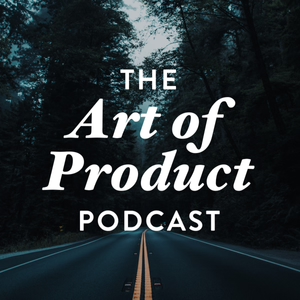
AI in Healthcare: Are we ready for data to examine us?
10/03/23 • 35 min
You've heard it from us before on this podcast, but we'll say it again. AI is transforming our world.
Depending on which market research you look at, AI in healthcare is already somewhere from a 14-21 billion dollar industry in 2023, which is almost double what it was worth just two years ago. By 2028, it's set to be a 100 billion dollar global industry, growing some 40% year-on-year. That's astonishing, even in the already skyrocketing AI sphere. In this episode, we'll be looking at a wide spectrum of expertise to get a sense of where the field is right now, what the future looks like, and some of the cool technologies which might fill it. We’ll be looking at the ways in which AI is making healthcare more efficient, and overcoming roadblocks, as well as examining the ethics of letting algorithms influence human outcomes.
We’re joined in this episode by Mike Woodacre, Chief Technologist at Hewlett Packard Enterprise. He starts by spelling out the origins of this explosive growth during the COVID Pandemic, which ushered in a new world of collaboration and inter-disciplinary use of AI and High Performance Computing to look at new vaccine options, as well as examine scientific research looking for patterns. He urges caution, though, in relying on AI solutions which haven’t been adequately trained in the locales they are being used in and so may not account for regional factors such as more or less common versions of a disease.
That’s something Andy Cachaldora, General Manager for Northern Europe at GE Healthcare, agrees with. They’ve seen an incredible expansion of AI tools not just in diagnostic machines, but also in making sure that every second of a healthcare professional’s time is being used wisely. For him, AI is about taking out the grunt work and uncertainty from running clinics, giving better outcomes all round. Again, however, he urges caution in the way AIs are trained and implemented, with poor data collection and poor planning a route to disaster.
The idea of good, global data sources to train AI is something that has inspired Joachim Schultze, professor of systems medicine from the German Centre for Neurodegenerative Medicine. In collaboration with HPE, he’s been working on a blockchain-based system of machine learning tools to analyse Leukaemia scans, which keeps the data in-hospital to ensure data protection, but sends the insights of the scans to dozens of other institutes worldwide to train their own machine learning algorithms. That’s ensuring that everyone’s AI is collaboratively being trained on the widest, global dataset possible, with no risk to patient privacy.
But where’s the human in all this? Well, right at the centre of it all. After all, any AI requires training, and the training in most cases is still provided by human medical experts, for use by their peers down the line.
And a fascinating new piece of research suggests that the reason AI imaging works so well is that the expertise of a dozen doctors looking at cases together – in clinic or when training Ais, are better than one. A kind of swarm intelligence or swarm learning experience. Rutwik Shah worked on the research at the Center for Intelligent Imaging, which found that by training with swarms of doctors, not only could inexperienced groups of junior doctors analyse scans more reliably than the best AI, they were as effective as groups of doctors with decades of experience. It’s fascinating work, which could revolutionise the way AIs are trained and behave, as well as changing the way scans are analysed.
It's a fascinating world. Come with us on the journey.
Citations:
00:57: https://www.apa.org/monitor/2022/01/special-burnout-stress
01:55: https://www.marketsandmarkets.com/Market-Reports/artificial-intelligence-healthcare-market-54679303.html?gclid=CjwKCAjw5_GmBhBIEiwA5QSMxOR1CRaYz_g_dcLRAd1aJwxb3tbPBUYcQ0l9mrrtZsRv93yUzWkJTRoCruUQAvD_BwE
https://www.statista.com/statistics/1334826/ai-in-healthcare-market-size-worldwide/
You've heard it from us before on this podcast, but we'll say it again. AI is transforming our world.
Depending on which market research you look at, AI in healthcare is already somewhere from a 14-21 billion dollar industry in 2023, which is almost double what it was worth just two years ago. By 2028, it's set to be a 100 billion dollar global industry, growing some 40% year-on-year. That's astonishing, even in the already skyrocketing AI sphere. In this episode, we'll be looking at a wide spectrum of expertise to get a sense of where the field is right now, what the future looks like, and some of the cool technologies which might fill it. We’ll be looking at the ways in which AI is making healthcare more efficient, and overcoming roadblocks, as well as examining the ethics of letting algorithms influence human outcomes.
We’re joined in this episode by Mike Woodacre, Chief Technologist at Hewlett Packard Enterprise. He starts by spelling out the origins of this explosive growth during the COVID Pandemic, which ushered in a new world of collaboration and inter-disciplinary use of AI and High Performance Computing to look at new vaccine options, as well as examine scientific research looking for patterns. He urges caution, though, in relying on AI solutions which haven’t been adequately trained in the locales they are being used in and so may not account for regional factors such as more or less common versions of a disease.
That’s something Andy Cachaldora, General Manager for Northern Europe at GE Healthcare, agrees with. They’ve seen an incredible expansion of AI tools not just in diagnostic machines, but also in making sure that every second of a healthcare professional’s time is being used wisely. For him, AI is about taking out the grunt work and uncertainty from running clinics, giving better outcomes all round. Again, however, he urges caution in the way AIs are trained and implemented, with poor data collection and poor planning a route to disaster.
The idea of good, global data sources to train AI is something that has inspired Joachim Schultze, professor of systems medicine from the German Centre for Neurodegenerative Medicine. In collaboration with HPE, he’s been working on a blockchain-based system of machine learning tools to analyse Leukaemia scans, which keeps the data in-hospital to ensure data protection, but sends the insights of the scans to dozens of other institutes worldwide to train their own machine learning algorithms. That’s ensuring that everyone’s AI is collaboratively being trained on the widest, global dataset possible, with no risk to patient privacy.
But where’s the human in all this? Well, right at the centre of it all. After all, any AI requires training, and the training in most cases is still provided by human medical experts, for use by their peers down the line.
And a fascinating new piece of research suggests that the reason AI imaging works so well is that the expertise of a dozen doctors looking at cases together – in clinic or when training Ais, are better than one. A kind of swarm intelligence or swarm learning experience. Rutwik Shah worked on the research at the Center for Intelligent Imaging, which found that by training with swarms of doctors, not only could inexperienced groups of junior doctors analyse scans more reliably than the best AI, they were as effective as groups of doctors with decades of experience. It’s fascinating work, which could revolutionise the way AIs are trained and behave, as well as changing the way scans are analysed.
It's a fascinating world. Come with us on the journey.
Citations:
00:57: https://www.apa.org/monitor/2022/01/special-burnout-stress
01:55: https://www.marketsandmarkets.com/Market-Reports/artificial-intelligence-healthcare-market-54679303.html?gclid=CjwKCAjw5_GmBhBIEiwA5QSMxOR1CRaYz_g_dcLRAd1aJwxb3tbPBUYcQ0l9mrrtZsRv93yUzWkJTRoCruUQAvD_BwE
https://www.statista.com/statistics/1334826/ai-in-healthcare-market-size-worldwide/
Previous Episode

Exascale: Are we ready for the next generation of supercomputers?
The dawn of the exascale computer has arrived. In May 2022, a computer named Frontier was switched on at the Oak Ridge National Laboratory in the USA. At well over twice the computing power of the previous world record holder, it has ushered in a new era of supercomputers, with at least two more to follow in the coming months and years.
In this episode, we’ll be looking at why this undeniably impressive milestone actually means, and more importantly, why it matters. We’ll also be looking at some of the challenges remaining as we enter the exascale era – namely, how do we actually use computers at this scale?
We’re joined in this episode by Mike Woodacre, Chief Technologist at HPE. He starts by spelling out some of the core statistics underpinning the Frontier exascale computer and its 60 million parts, as well as some of the challenges endemic to computing at the cutting edge of technology.
We also meet Doug Kothe, former Director of the Exascale Computing Project at Oak Ridge National Laboratory. He’s hugely excited about the possibilities of exascale as a source of incredible compute in-depth with the ability to return answers to complex questions and simulations in almost real-time. At the same time, he’s also keen to use Frontier as a gateway to open up HPC and supercomputing to more and more organizations, via an ‘app store’ which allows potentially thousands of users simultaneous access to Frontier for their own needs.
For different reasons, Professor Rick Stevens is also excited to be entering the exascale age. He’s Argonne National Laboratory’s Associate Laboratory Director for Computing, Environment and Life Sciences. He’s keen to put their upcoming Aurora exascale computer to work on projects to revolutionise cancer treatments, from diagnostics to drug discovery, through his CANDLE program. Rick’s also cautious, though. Whilst he appreciates the promise that exascale offers, he knows that it’s not an end-goal, but a stepping stone to the next generation and new technological advances.
That’s a sentiment shared by our final guest, Cristin Merritt. She’s the Chief Marketing Officer at Alces Flight, an HPC solutions provider. She’s keenly across worldwide demand for supercomputing power, and sees an evolving landscape of commercial demand and supply growing out of the innovations that exascale offers. She’s cautious, though – right now, exascale is too experimental and non-standard to be commercially mass-market. With time, though, she believes that might just change.
Next Episode

Routes into STEM – Could apprenticeships solve the tech talent crunch?
Routes into STEM – Could apprenticeships solve the tech talent crunch?
There’s an acute shortage of candidates for tech jobs – in fact, research suggests tens of millions of potential roles are going unfilled. In a poll with global technology chiefs conducted by MIT’s ‘Technology Review’, a majority found that they weren’t getting enough candidates for roles, and those who did apply lacked necessary skills.
Clearly, there’s a problem here. So what can tech companies do to bring more talent through the door? Could building a baseline of investment in new, or even unqualified, talent be a solution?
Maninder Randhawa believes so. He’s the Early Careers Leader for Hewlett Packard Enterprise in the UKIMEA region, and spends his time building programmes to upskill the organizations new talent. He believes that, whilst there’s absolutely a place for old hands, the fresh ideas and ability to adapt and mould that new talent brings makes them more than worth the investment.
A case in point is Stu Franks of Alces flight, an HPC services provider. He began at the firm at age 18 as a school leaver, and now heads a team building and marketing services and solutions. He believes apprenticeships, like his own, offer a route to great talent that’s not suited to academia but has all the practical talent and intelligence needed to excel in the field, and values demonstrable skills, personality and attitude above degrees and certificates.
In order to attract young people into the STEM fields, though, they need to know about it. That’s where outreach groups like Stemettes come in. They are a UK-based organization dedicated to reaching out to underrepresented groups in schools across the country, with programs to engage young people in STEM careers as an option, and provide mentoring and support for them to take their first steps. Floriane Fidegnon got into tech through the work of the group and now sits on the board, something her employer encourages as it creates a virtuous cycle of bringing in new talent, and encouraging existing talent like Floriane to become engaged ambassadors for the field.
But what about the kind of soft skills that come with a degree – just not one in STEM topics? Erin Young is a case in point. She’s a lead researcher for the Alan Turing Institute, which is dedicated to solving societal problems with technology. She came into the field from a background in classics, where her skills in research, reasoning and analytics, combined with a love of data analytics, made a move into tech a great – if seemingly disconnected – jump.
Sources cited in this episode:
85 million unfilled tech roles by 2030: https://www.kornferry.com/insights/this-week-in-leadership/talent-crunch-future-of-work
MIT Technology Review poll with tech leaders on talent shortages: https://www.technologyreview.com/2023/09/21/1079695/new-approaches-to-the-tech-talent-shortage/
STEM apprenticeships in the UK increased by over a quarter in the last decade: https://explore-education-statistics.service.gov.uk/find-statistics/apprenticeships-and-traineeships
The National Science Foundation report on the STEM workforce between 2011 and 2021: https://ncses.nsf.gov/pubs/nsf23315/report/the-stem-workforce#:~:text=The%20size%20of%20the%20STEM,2011%20to%2024%25%20in%202021
UK government report into diversity and inclusion in STEM: https://committees.parliament.uk/publications/34531/documents/190060/default/
If you like this episode you’ll love
Episode Comments
Generate a badge
Get a badge for your website that links back to this episode
<a href="https://goodpods.com/podcasts/technology-untangled-282214/ai-in-healthcare-are-we-ready-for-data-to-examine-us-35284007"> <img src="https://storage.googleapis.com/goodpods-images-bucket/badges/generic-badge-1.svg" alt="listen to ai in healthcare: are we ready for data to examine us? on goodpods" style="width: 225px" /> </a>
Copy




